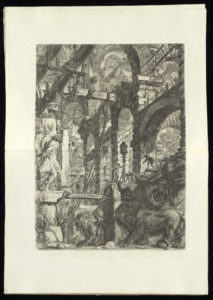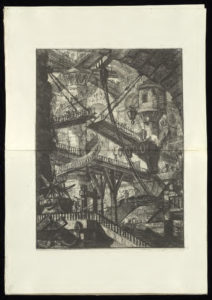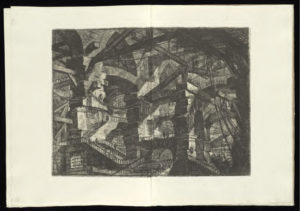frus·trat·ed fan·ta·sy nov·el·ist, n. A caricature of a tabletop roleplaying referee who has developed a complex imaginary world, or particular plot, and would really much rather show players around or tell a predetermined story than play a game.
The frustrated fantasy novelist approach has rarely, if ever, tempted me. Perhaps, though, there is another loosely related set of motivations that might apply to some degree: frustrated fantasy architect. By architect, I mean specifically a planner of built spaces. I find few things as compelling as exploring, or watching players explore, the remains of a vast buried city, or derelict spacecraft, or lightless underworld. This thought occurred to me many times as I was listening to Susanna Clarke’s 2020 novel Piranesi. Though the setting for the novel is primarily a stage upon which to present the protagonist’s experience rather than an unknown expanse to explore in a cartographic sense, the end result brings to mind the mysterious otherness of the best tabletop roleplaying game dungeons.
I will avoid talking much about the plot, both because part of the pleasure in the story is gradually realizing the nature of the situation along with the protagonist and because I want to focus more on the evocation of imagined space. What drew me in was the limited viewpoint that grows to slowly encompass greater realization, and the sense of destabilization and shifting beliefs that accompany the expansion of knowledge. The story begins in a labyrinth, which is also the world; it is a tangle of architecture, tides, and uncountable statues; an endless expanse of halls. If you have seen etchings by the historical Giovanni Battista Piranesi, the Venetian artist, you probably already have some approximate image of this space in your mind. The Piranesi of Clarke’s story knows of 15 people, and for Piranesi the labyrinth is the whole of existence.
In a roleplaying game, satisfying architectural exploration for me requires some degree of concreteness and detail, akin to procession through a region in Dark Souls or a creatively designed stage for a first person shooter. Different areas must relate with a strict spatial logic. Though this logic need not by conventional or Cartesian, it must involve more structure than a narrative sequence. As a tangential point, practical architecture that is suitable for use in the prosaic world is too repetitious, predictable, and symmetrical to be ideal for exploring as a dungeon. The most effective and interesting dungeon spaces are like expressionistic recasting of identifiable architectures. The labyrinth in this story is too abstractly depicted to be a good example of a roleplaying game dungeon, being loosely sketched to evoke the feeling tone of the story protagonist. Though Piranesi often mentions specific halls by name, and describes distinctive features in detail, the spaces are floating vignettes that emerge and fade away to support scenes rather than spaces of complex relation. I intend this not as negative judgment, since the depiction works well in the context of the story, but instead to make it clear how the story communicates the feel of a dungeon-like space without taking the audience through a process of exploration.
The story was not what I was expecting, though afterwards I can see similarities to Clarke’s other work. Though much shorter than her more well-known novel, Jonathan Strange & Mr Norrell (2004), Piranesi still reaches a length that I think most people would say “counts as a novel” (a web search tells me 272 pages). Despite this, it feels like a short story, and I mean this in the best possible way; the story is tightly crafted, with few extraneous events or digressions when seen as a whole, and though the pacing is languid on the surface, I found the story to be enthralling, even riveting. It is without question one of my favorite novels published somewhat recently (recently in the historical sense; say, after the year 2000). Despite that acclamation, Piranesi is a concept album of a book, and while Clarke avoids ostentatious experimental literary technique, the approach is still something other than conventional third person realism. I could see how this might lead some people to come away feeling like the book is somewhat contrived or affected, but the approach landed for me.
The version to which I listened, from Audible, was read by Chiwetel Ejiofor. It may be the best audiobook performance I have come across, and I have listened to quite a few audiobooks since covid began. (Also, one of my parents worked in audiobook publishing for a stretch, so I heard many when I was younger. Even considering all of those, and with the caveat that it has been a while, this may still be the best reading I have heard.) The publisher has made available an excerpt you can listen to on YouTube. Chiwetel reads slowly, very clearly, in a way that perfectly captures Piranesi’s curious demeanor but also his fundamentally strange and alien beliefs about the nature of reality. Unfortunately, I see only a few other audiobook performances by him, but at least one of them is an audio dramatization of Othello (along with several other performers), which I am now anticipating.
I conclude with a brief nested quotation. What follows is Thomas De Quincey quoting a section from book two of Wordsworth’s poem The Excursion. Before this quoted section, De Quincey described (with considerable creative license) Coleridge recalling a plate from Piranesi’s Carceri d’Invenzione.
With the same power of endless growth and self-reproduction did my architecture proceed in dreams. In the early stage of my malady, the splendours of my dreams were indeed chiefly architectural: and I beheld such pomp of cities and palaces as was never yet beheld by the waking eye, unless in the clouds. From a great modern poet I cite part of a passage which describes, as an appearance actually beheld in the clouds, what in many of its circumstances I saw frequently in sleep:
The Appearance, instantaneously disclosed,
Was of a mighty City—boldly say
A wilderness of building, sinking far
And self-withdrawn into a wondrous depth,
Far sinking into splendor—without end!
Fabric it seemed of diamond and of gold,
With alabaster domes, and silver spires;
And blazing terrace upon terrace high
Uplifted; here, serene pavilions bright,
In avenues disposed; there, towers begirt
With battlements that on their restless fronts
Bore stars—illumination of all gems!
By earthly nature had the effect been wrought
Upon the dark materials of the storm
Now pacified; on them, and on the coves
And mountain-steeps and summits, whereunto
The vapours had receded, taking there
Their station under a cerulean sky., &c. &c.



